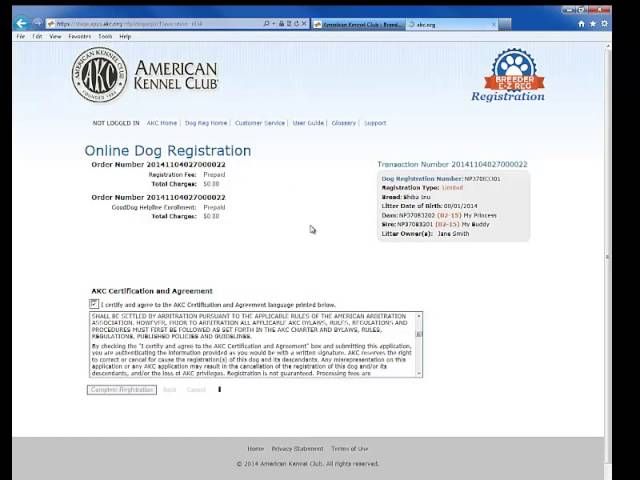What Are Papers?
When buying a dog, “papers” refers to documentation certifying the dog’s identity, health, and lineage.
The most common types of papers are:
- Registration – Documents from a registry like the American Kennel Club (AKC) certifying the dog’s breed and identity. According to the AKC, “The terms ‘papers’ and ‘AKC-registrable/AKC-registered’ are not interchangeable. Buyers must look for AKC registration, the only registry that offers the security of third party oversight” (AKC).
- Pedigree – A family tree tracing the dog’s ancestry. Pedigrees are issued by registries like the AKC.
- Health certificates – Documentation from a veterinarian certifying the dog’s health and vaccination records (Jennalee Doodles).
Having papers helps verify the dog’s breed, lineage, and health. It provides important information for new owners.
Why Papers Matter
Dog registration papers serve as proof of a dog’s breed, health, and lineage. According to the American Kennel Club (AKC), papers “verify that a dog is the offspring of the parents listed on their pedigree.”
Having registration papers can offer valuable insight into your dog’s genetic background. The papers provide information on the dog’s family tree, allowing you to research health concerns, temperament, or conformance to breed standards of their ancestors. This helps determine potential health risks your dog may face.
Additionally, papers enable you to validate that your dog is a purebred and not a mixed breed if that’s important to you for showing, breeding, or predictability of size and temperament. AKC registration, for example, requires a three-generation pedigree to be eligible.
Overall, while not always essential, papers provide transparency into your dog’s history. This allows you to make more informed decisions about health, training, and care.
AKC Registration
The American Kennel Club (AKC) offers registration services for purebred dogs in the United States. According to the AKC’s website, “Registering your dog with the AKC means that you’ll have access to training and events specifically designed for purebred dogs and their owners” (https://www.akc.org/register/).
The requirements for AKC registration depend on whether you own the litter or are registering an individual dog. For litter registration, the dam must be AKC registered and the sire must be AKC registered or from a registerable breed. DNA certification may be required for certain breeds. Individual dog registration requires AKC registration papers from the breeder. The current fee is $35-55 depending on the dog’s age at the time of registration.
Benefits of AKC registration include eligibility for AKC events like dog shows, performance sports, and trials. You will receive an official AKC pedigree and can get AKC titles for your dog. Your dog’s information will be recorded in the AKC database for posterity. Overall, AKC registration provides your dog recognition as a purebred.

Other Registries
There are several other reputable dog registries besides the AKC that issue registration papers for purebred and mixed breed dogs, including:
The Canadian Kennel Club (CKC) is considered the AKC equivalent in Canada, also maintaining breed standards and pedigree records for purebred dogs like the AKC. According to the Dog Clubs and Registries site, the CKC issues papers for over 200 breeds.
The United Kennel Club (UKC) is the second largest purebred registry in the United States after the AKC, recognizing over 300 breeds according to this dog forum discussion. The UKC offers single registration papers without needing a litter application.
Other international kennel clubs like The Kennel Club (KC) in the UK also provide valid purebred registration similar to the AKC. There are over a dozen reputable domestic and international registries documented by the Entirely Pets Newfoundland breeders site here.
Health Certificates
A health certificate (also called a veterinary health certificate or health certificate for dogs) is an official document filled out and signed by a licensed veterinarian to certify that a dog is free from infectious diseases and is healthy enough to travel. Health certificates are required when crossing state lines or international borders with a dog.
To obtain a health certificate, the dog must first undergo a thorough veterinary health exam. The exam checks for signs of infectious diseases like rabies, parvovirus, and parasites. The dog’s vaccination records are reviewed to ensure all standard vaccines are up-to-date, like rabies, distemper, parvovirus, and bordetella. Some states or countries may require additional vaccinations like leptospirosis or the canine influenza vaccine.
The health certificate itself includes information like the dog’s microchip number or tattoo, age, sex, breed, color, and markings. It lists out the vaccination dates and types of vaccines given. The examining veterinarian will fill in the date of examination and sign and stamp the completed certificate.
Health certificates are usually valid for a limited window, often 10-30 days from the date of examination. So it’s important to time the vet visit appropriately before intended travel dates. Expect to pay a fee charged by the veterinary clinic for the exam and certificate completion.
Pedigrees
A pedigree is a family tree that lists a dog’s ancestors for three or more generations (AKC, 2022). Pedigrees are important because they provide insight into a dog’s family history and genetic makeup. Purebred dogs will have a pedigree from a major kennel club like the AKC that verifies their ancestry and breed purity. Crossbreed and mixed breed dogs typically won’t have an official pedigree.
There are a few key reasons why pedigrees matter for dogs (Purina, 2023):
- Pedigrees allow breeders to make careful selections about breeding dogs to reduce the chances of genetic diseases being passed on.
- They provide insight into the ancestry and lineage of a dog, which is useful for buyers looking for well-bred dogs.
- Registration records are maintained by kennel clubs based on pedigrees to preserve breed standards.
- Genetic diversity is maximized when pedigrees are carefully studied since inbreeding can introduce health problems.
Overall, pedigrees give transparency into a dog’s family tree, allowing responsible breeding and informed selection of dogs. Reputable breeders invest significant effort into maintaining detailed pedigree records for their dogs.
Titles and Achievements
One of the benefits of purchasing a purebred dog from a responsible breeder is that many come with registration papers from AKC or another reputable registry. Registration allows you to participate in various dog sports and earn titles and achievements.

In the conformation show ring, titles recognize qualities related to a breed’s standard and appearance. Some common AKC conformation titles include:
- Champion (Ch) – awarded to dogs that accumulate 15 points at AKC conformation shows.
- Grand Champion (GCh) – awarded to dogs that accumulate 25 points after achieving a Ch title.
- Bronze Grand Champion (BISS GCh) – awarded for additional Grand Championship points and Best in Show wins.
For obedience and working titles, AKC recognizes achievements in areas like agility, tracking, hunting, and more. Some examples are:
- Companion Dog (CD) – basic obedience title.
- Utility Dog Excellent (UDX) – highest obedience title.
- Master Agility Champion (MACH) – elite AKC agility title.
- Master Hunter (MH) – advanced hunting test title.
Earning titles demonstrates a dog’s abilities and provides activities for dogs and owners to enjoy together. Discuss options with your breeder if interested in pursuing titles.
Cost Considerations
The cost of registering a dog with the American Kennel Club (AKC) varies depending on the type of registration and any additional services requested. According to the AKC’s fee schedule (https://www.akc.org/register/information/fee-schedule/), the basic registration fee for an individual dog is $39.99 for a paper application or $33 for an online application. This covers the registration itself but does not include a pedigree. Adding a 3-generation pedigree to the registration costs an additional $25, bringing the total to $64.99 for paper registration with pedigree.
According to answers on Quora (https://www.quora.com/How-much-does-it-cost-to-AKC-register-a-dog), some other common AKC registration costs are:
– $85-95 for an AKC Breeder Pack which includes registration for a litter of puppies
– $35-50 for a transferred ownership registration
– Additional fees for late registrations past age 1 or 2
– Additional costs for optional packages like the Platinum package with framed certificate, ID card, and more
So while basic AKC registration may start around $35-40, owners should be prepared for potential added fees depending on the situation. Pedigrees, ownership transfers, and late registrations can all increase the total cost. However, registration provides proof of pure breeding and supports responsible breeding practices.
Adopted and Mixed Breed Dogs
Many dogs available for adoption are mixed breeds or do not have verifiable pedigree paperwork. This does not mean they cannot make wonderful pets. However, it’s important to understand your options when adopting a dog without papers.
While purebred dogs come with registration documents like pedigrees from the AKC, adopted and mixed breed dogs often lack this official paperwork. Shelters and rescues may provide guesswork on the dog’s breed mix, but research shows visual breed identification is often inaccurate. DNA tests like Embark and Wisdom Panel can help identify breed ancestry, but lack official registry validation.
The lack of papers does not indicate poorer health or temperament. In fact, mixed breeds often have increased hybrid vigor. Focus on each dog’s individual personality and needs, not their breed label. Provide proper socialization, training, exercise, and veterinary care to set them up for success.
While adopted mixed breeds may not come with official pedigree papers, they offer the unconditional love of a devoted companion. Make an informed choice by looking beyond breed labels when bringing home your new best friend.
Making a Decision
When deciding whether to get a dog with papers, it’s important to weigh the pros and cons.
Some of the potential advantages of getting a papered dog include:
- Proof of purebred status and ancestry (source: https://www.akc.org/press-center/articles-resources/puppy-buyer-fact-sheet/)
- Ability to participate in certain dog shows and competitions (source: https://www.yourpurebredpuppy.com/buying/articles/AKC-registered-puppies.html)
- Reassurance about health and genetic screening of the parents (source: https://www.quora.com/If-I-buy-a-dog-thats-papered-without-the-papers-do-the-owners-still-have-rights-to-the-dog)
Some potential drawbacks of getting a papered dog are:
- Higher purchase price
- Registration restrictions from breeder
- Limitations on breeding
Ultimately it comes down to your priorities as a dog owner. If participating in dog sports or having a purebred is important, papers may be worthwhile. But for many pet owners, papers are not essential.
